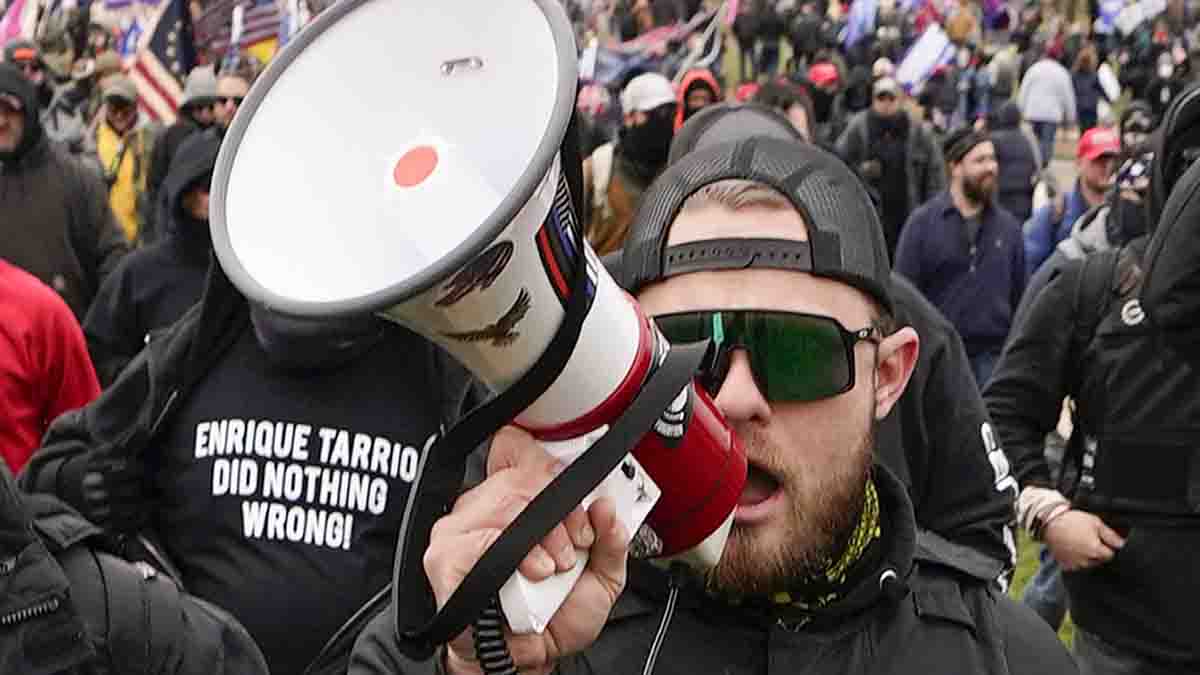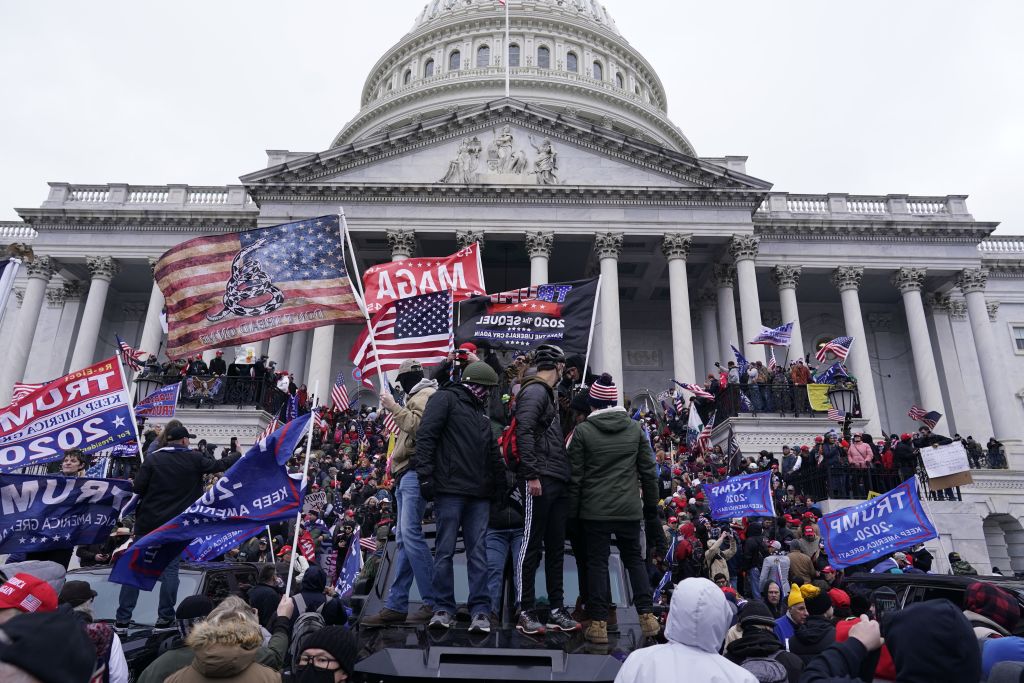Former Proud Boys leader Enrique Tarrio was sentenced to 22 years in prison for orchestrating a failed plot to keep Donald Trump in power after he lost the 2020 election. NBC6’s Julia Bagg reports
Former Proud Boys national chairman Enrique Tarrio was sentenced to 22 years in prison on Tuesday for a plot to attack the U.S. Capitol in a failed bid to stop the transfer of presidential power after Donald Trump lost the 2020 election.
Tarrio was the final Proud Boys leader convicted of seditious conspiracy in the Jan. 6, 2021, attack to receive his punishment. It's the longest sentence for any of the defendants in the attack.
Watch NBC6 free wherever you are
Three fellow Proud Boys found guilty by a Washington jury of the rarely used sedition charge were sentenced last week to prison terms ranging from 15 to 18 years.
The Justice Department wanted the 39-year-old Tarrio to spend more than three decades in prison, describing him as the ringleader of a plot to use violence to shatter the cornerstone of American democracy and overturn the election victory by Joe Biden, a Democrat, over Trump, the Republican incumbent.
Get local news you need to know to start your day with NBC 6's News Headlines newsletter.
Tarrio, who has been locked up since his March 2022 arrest, appeared in court in an orange jail uniform and quietly conferred with his lawyers as the hearing got underway in Washington's federal courthouse.
Rising to speak before the sentence was handed down, Tarrio pleaded for leniency, describing Jan. 6 as a “national embarrassment,” and apologizing to the police officers who defended the Capitol and the lawmakers who fled in fear. His voice cracked as he expressed remorse for letting down his family and vowed that he is done with politics.
“I am not a political zealot. Inflicting harm or changing the results of the election was not my goal,” Tarrio said.
“Please show me mercy,” he said, adding, “I ask you that you not take my 40s from me.”
U.S. District Judge Timothy Kelly, who was nominated to the bench by Trump, agreed with prosecutors that Tarrio's case could be punished as “terrorism” — increasing the recommended sentence under federal guidelines. But judges have wide discretion when handing out punishments, and Kelly ultimately sentenced Tarrio's co-defendants to prison terms far shorter than those sought by prosecutors.
Tarrio wasn't in Washington on Jan. 6 — he was arrested two days earlier in a separate case — but prosecutors say he helped put in motion and encourage the violence that stunned the world and interrupted Congress' certification of Biden's electoral victory.
RELATED STORIES
Prosecutor Conor Mulroe told the judge that the Proud Boys came dangerously close to succeeding in their plot to stop the transfer of presidential power — and noted that “it didn’t take rifles or explosives.”
“There was a very real possibility we were going to wake up on Jan. 7 in a full-blown constitutional crisis,” Mulroe said, with “300 million Americans having no idea who the next president would be or how it would be decided.”
The prosecutor urged the judge to ensure that “consequences are abundantly clear to anyone who might be unhappy with the results of 2024, 2028, 2032 or any future election for as long as this case is remembered.”
Tarrio, of Miami, was supposed to be sentenced last week in Washington's federal court, but his hearing was delayed because Kelly got sick. Kelly, who was nominated to the bench by Trump, sentenced Tarrio's co-defendants to lengthy prison terms — though far shorter than what prosecutors were seeking.
Ethan Nordean, who prosecutors said was the Proud Boys' leader on the ground on Jan. 6, was sentenced to 18 years in prison, tying the record for the longest sentence in the attack. Prosecutors had asked for 27 years for Nordean, who was a Seattle-area Proud Boys chapter president.
Oath Keepers founder Stewart Rhodes, who was found guilty of seditious conspiracy in a separate case, was sentenced in May to 18 years in prison. Prosecutors, who had sought 25 years for Rhodes, are appealing his sentence and the punishments of other members of his antigovernment militia group.
Lawyers for the Proud Boys deny that there was any plot to attack the Capitol or stop the transfer of presidential power.
“There is zero evidence to suggest Tarrio directed any participants to storm the U.S. Capitol building prior to or during the event," his attorneys wrote in court papers. “Participating in a plan for the Proud Boys to protest on January 6 is not the same as directing others on the ground to storm the Capitol by any means necessary.”
The defense asked the judge for no more than 15 years in prison, arguing that their client should not be punished as harshly as the Oath Keepers’ Rhodes, who was present on Capitol grounds on Jan. 6. Tarrio’s lawyers described him as a “keyboard ninja” who was prone to “talk trash,” but had no intentions of overthrowing the government.
“My client is no terrorist,” attorney Sabino Jauregui said. “My client is a misguided patriot.”
Police arrested Tarrio in Washington on Jan. 4, 2021, on charges that he defaced a Black Lives Matter banner during an earlier rally in the nation’s capital, but law enforcement officials later said he was arrested in part over concerns about the potential for unrest during the certification. He complied with a judge’s order to leave the city after his arrest.
On Jan. 6, dozens of Proud Boys leaders, members and associates were among the first rioters to breach the Capitol. The mob’s assault overwhelmed police, forced lawmakers to flee the House and Senate floors and disrupted the joint session of Congress for certifying Biden’s victory.
The backbone of the government’s case was hundreds of messages exchanged by Proud Boys in the days leading up to Jan. 6. As Proud Boys swarmed the Capitol, Tarrio cheered them on from afar, writing on social media: “Do what must be done.” In a Proud Boys encrypted group chat later that day someone asked what they should do next. Tarrio responded: “Do it again.”
“Make no mistake,” Tarrio wrote in another message. “We did this.”



